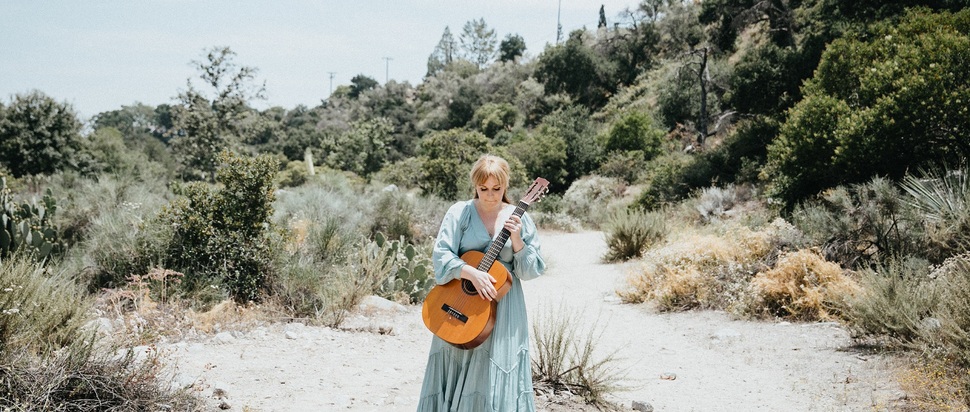Unapologetically Me: Isobel Campbell on her new album
Isobel Campbell is moving on from label woes and legal struggles, from Belle & Sebastian and Mark Lanegan, finally releasing her first solo album in 14 years. She talks about her recent turmoil and finding peace in mindfulness
Root canal treatment must be excruciating. A stranger gouging around the nerve endings of a decayed tooth; it sounds uncomfortable, to say the least. You’re probably experiencing the pain vicariously as you read these words. But for Isobel Campbell, who has just had the procedure – “sorry if I sound funny, my mouth’s a bit sore,” she understates – it wasn’t quite as torturous as the path leading to the release of her first set of recordings in over a decade.
Finished over three years ago, There Is No Other finally sees the light of day this month. It’s been a turbulent process of dashed hopes, sudden label closures and legal battles for Campbell to grapple back this record. The Glasgow-born, now Los Angeles-based, singer-songwriter and sometime cellist seems relieved, though wrung out, now that the wait is over. “It feels like it has taken forever,” she says. “There were moments when I thought it was never going to come out. I’ve talked about it so much and it’s so fucking depressing. I’ve known easier things.”
Perhaps best known for her work in the early years of Belle & Sebastian, and last heard from around the release of Hawk – the finale of a triptych of fruitful collaborations with sandpaper-voiced crooner Mark Lanegan – Campbell has a significant body of independent work, which There Is No Other was set to add to before she was plunged in the midst of problems that were no fault of her own.
It is unfortunately too frequent for solo female artists to come up against the unpredictability of the business side of music, with the likes of Cat Power and TORRES, perhaps a little more present in the world of indie music than Campbell had become, also working at the behest of an industry without their artistic interests in mind and coming up against label-shaped roadblocks. Campbell has experienced more than most. “I’ve been doing this since I was 19. I’m now 43, and I’ve had only a tiny purple patch with this stuff. It’s always been a fight.”
Understandably, Campbell is keen to talk about the music she’s been forced to sit on rather than the tussles with her former label. “I feel like I have PTSD,” she says, which would be flippant were it not for the sincerity and world-weariness with which she recounts her traumatic last few years. The record that it's led to contains none of the anger and vitriol you might expect. That’s because it has gone untouched since completion but, when she speaks, it would be difficult to imagine Campbell making music infected with angst.
There Is No Other permeates levity, positivity and calm. Recorded with Campbell’s husband, studio engineer Chris Szczech, sonically it glows with a surprising benevolence. Compared to Campbell’s recent experiences and popular music’s willing embrace of gloom, it is a total balm. It would be easy enough for even a practised songwriter like Campbell to return to the public consciousness with an attempt at replicating what has the biggest guarantee of success. “I just wanted to make something that I liked and be true to myself, unapologetically me. When I was a lot younger, I would get a bit of grief for being soft. Now I’m like fuck that, this is what I am.”
A cursory search of old reviews shows the negatively implied (“twee”, “fey”), and in some cases subtly gendered (“winsome”), vocabulary used to describe Campbell’s art and demeanour. There Is No Other leans into those adjectives unapologetically, tying in Campbell’s “complete commitment” to meditation and mindfulness, incorporating ancient Mayan teachings and the five precepts of Reiki, a Japanese alternative healing technique, and a smoothed out but relaxing Tom Petty cover.
If cod-philosophy and pseudoscience seems off-putting (is it any different from an artist’s faith or spirituality driving their work?), Campbell has no desire to be preachy. “It’s not something strange or new: wifeys in Scotland have been doing it since before I was born. I love what it’s done for me. I come from a long line of worriers – it’s been really helpful, and I want to be open about it. If someone else decides they’re into it, that’s good for them.”
The album is only holistic in a general sense, an antidote to what is most prevalent in the world. “I think a lot of the time, good art focuses on this darkness,” says Campbell. “This was just me saying there's so much dark already – let’s have a bit of light.”
The west coast, Campbell says, has cultivated her interest in the practice, and helped her take stock of what was going on around her. Many of her observations – on ever visible and unaddressed homelessness in the city (Boulevard) and the constant velocity of a society that never sleeps (Ant Life) – populate the songs that resulted.
LA is her home now, but she pines for Scotland. “Homesickness is pretty brutal. It’s funny how it manifests. When I first moved over here, I would crawl over broken glass, like I was a total alien and tried to fit in. But now I’ll use Scottish words no one understands, like scunnered. I don’t care.”
Even though the album predates it, after the turmoil, it’s a reflection of where Campbell is at in her life now: at peace with herself and living in the present.
There Is No Other is released on 31 Jan via Cooking Vinyl
Isobel Campbell plays Celtic Connections: The Mackintosh Church, Glasgow, 30 Jan
isobelcampbell.com
